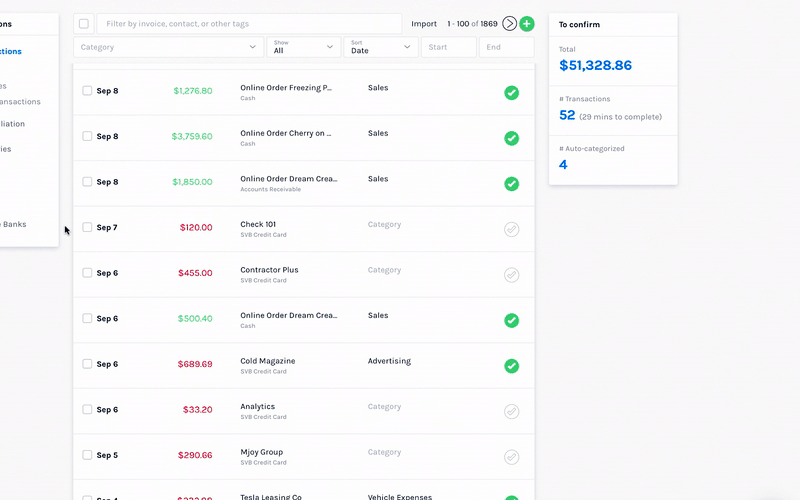by Tim Chaves
What is Corporate Accounting and how does it compare to Public Accounting?

Whether you’re starting out in your accounting career, looking to transition between fields, or just plain curious, it’s important to define corporate accounting and know how it differs from a career in public accounting.
What is corporate accounting?
Accountants who work in the corporate or private sphere are employed by non-accounting companies rather than accounting firms. They can work in small local offices, national corporations or international companies.
Typically, corporate accountants will work in a team or department under the direction of the CFO (Chief Financial Officer)—though you’ll occasionally see an accounting party of one.
Rather than helping a wide-range of clients, private accountants work for a single company, developing an impressive depth of knowledge into their industry or niche. They typically choose to stay in that specific industry, gaining specialized knowledge. Some corporate accountants even work their way up to CFO.
How is corporate accounting different than public accounting?
The primary difference between corporate and public accountants is who they work for (i.e. a single corporation or the general public).
Public accountants work in firms selling accounting services, while corporate CPAs work at companies selling something other than accounting services (think: the accounting department at Dunder Mifflin).

“No, it’s not Ashton Kutcher. It’s Kevin Malone.”
Many recent grads choose to start in public accounting to build a foundation for later work in the corporate sphere. Public accounting has the advantage of providing a breadth of knowledge, while corporate accounting provides a greater depth.
Work-life balance can be a beast during tax season—in either position. However, private accountants may find that they have a more stable schedule year round, while public accountants tend to see more fluctuation. Fortunately, many accounting firms are lessening required hours in the summer in order to offset the strain of the busy season (and be more competitive in hiring).
Corporate accountants may start out with higher pay, though the opportunities for promotion can be leaner. In an accounting firm, on the other hand, progression can be quick and there’s always the potential to become a manager or partner.
What are the duties of a corporate accountant?
Depending on the size and scope of the company, a day in the life of a corporate accountant can look very different.
Typically, however, this kind of accountant works a 9 to 5 job in a corporate office. They may work individually as well as in teams. Here are some of the primary tasks and responsibilities a corporate accountant might perform:
Basic Bookkeeping
Like any accounting job, there’s bound to be some reconciliation and categorization. Depending on the size of the company, there may be a team of entry-level bookkeepers for basic accounting tasks.
Report Creation
Corporate accountants are responsible for creating the financial reports that executives use to make strategic business decisions. They will need to gather data from multiple departments, divisions and even locations in order to provide an accurate and up-to-date representation of the company’s financial standing.
ZipBooks provides multi-location reporting for streamlined data consolidation
Financial Analysis
Many corporate accounting teams will lend their insight to the financial analysis of the business. They’ll make sure that capital is being used effectively and advise on investments and projects.
Budget Planning
Private accountants will prepare and plan budgets for the year. They’ll routinely run audits to make sure departments stick to their budgets and meet spending and profit goals.
Business Forecasting
Forecasting in business is a decision-making tool that helps companies prepare for the future by optimizing operations. Because corporate accountants are most knowledgeable about the numbers driving a company’s success or failure, they are critical in data-driven decision-making.
Payroll Processing
It’s not uncommon for accountants to run payroll, though the responsibility can be shared with the HR department in a larger company. Payroll accounting includes calculating staff salaries, handling employee taxes, retirement account distributions, overtime compensation, and more.
Expense Management
In addition to handling the payroll, accountants working for a corporation often handle expenses. From approving expense requests and processing invoices to inventory tracking and absorption costing, private accountants have to keep a keen eye on business spending.
Receivables Tracking
While some companies will have a team solely devoted to bringing in money, often times, accountants will manage accounts receivables. Corporate accountants may be required to handle past due payments from clients or work with collections agents to improve cash flow.
How to write an invoice that gets paid faster
What are the benefits of a career in corporate or public accounting?
Everyone’s accounting journey will look a little different—to really determine whether public or corporate accounting is right for you, you’ll need to do some serious self-reflection.
Craig Lewis, a Tax Associate at Haynie and Company, loves working in public accounting because of the variety it brings and the meaningful client relationships.
“Corporate accounting you do similar things each day, each year. In public accounting, I get new clients often and love forming a long-lasting relationship with them.
Plus, you get paid more the more clients you bring in. There’s nothing like that in corporate accounting that I’m aware of.”
Craig admits that tax seasons in public accounting can be crazy—“it’s 12 hour days doing nothing but individual and business tax returns. There isn’t really time for much else…The CPA life can take its toll.”
But in general, the schedule seems to be a bit more flexible: “it’s pretty easy to get away, take a long lunch, sneak out early. During the summer, my typical day consists of accounting projects, helping with amended or extended tax returns, property tax filings, monthly bookkeeping, and tax planning.”
Corporate accounting brings its benefits as well. Chelsea Chase, the Controller at Mickelsen Farms and a previous intern at Deloitte, says that she chose corporate accounting because the consistent work schedule fit her needs better. A typical day for her consists of checking for fraud, making entries and completing bank reconciliations.
While Chelsea did intern in public accounting, it’s unlikely that she’d transition back into that field. She explains, “I don’t think it would meet the needs of my family to have 3-4 months getting home so late.” Besides, the things that are different about private accounting, are the things that Chelsea loves:
“In corporate accounting you are making the company, where in public accounting you only get a glimpse into a company.”
Andrew Hubbard, who also works in corporate accounting, agrees with Chelsea: “I felt that corporate accounting would give me the best learning experience. I have the opportunity to learn a little about everything in accounting and really dive into it rather than just focusing on 1 thing (i.e. taxes).”
Other benefits of a career in corporate accounting include:
- Work-life balance—the busy season can still be taxing (eh?) but the difference in hours isn’t as dramatic
- Specialization—accountants with specialized experience appeal to niche industries, like big retailers and government agencies
- Consistency—the comfort of a daily routine, central location, and dependable salary
- Incentives—aside from salary, large corporations tend to offer competitive compensation packages (stock options, bonuses, pension, etc.)
- Job Satisfaction—not just working for clients, more invested in the company and actively contributing to the bottom line
Note: While there’s no rule that says you can’t transition between corporate and public accounting, it can be difficult. Most accountants say that it’s relatively easy to switch over to corporate accounting after having worked in the public sphere, but it’s much harder to go from corporate to public. For this reason, many CPAs start in a public accounting position to get some foundational experience.
How do I get started?
For both public and corporate accountants, your first step is getting a Bachelor’s Degree—likely in accounting or finance.
While you’re in school, get some experience! Entry-level bookkeeping positions don’t require a degree, but give you invaluable insight into the field you’re pursuing. While an official internship at an accounting firm can look great on a resume, you could also consider freelance bookkeeping. Accounting software companies–like ours–often provide a discounted package to bookkeepers who are looking to build up their client base.
Get used to the software that’s out there. Start playing around with bulk reconciliation or auto-categorization.
Once you’re ready to find some clients, do everything you can to streamline communication and make their lives easier. For example, with ZipBooks Accountant, you can send a text directly from your dashboard if you have a question about a certain transaction. Your client receives your message on their phone and can respond immediately. Being able to work faster and improve client relationships will give you an edge in modern bookkeeping.

Messaging+ with ZipBooks Accountant
Once your undergrad is finished, you may consider getting a Masters Degree (especially if you want to specialize in tax or administration). To become a licensed Certified Public Accountant, you must also pass the CPA exam. Passing the CPA exam is no joke, it’s been compared to the California Bar Exam in difficulty. So don’t be surprised if you take the test more than once.
Research companies you want to work for (this will vary for public vs corporate accountants) and consider your career path. If you’re hoping to work for one of the Big 4 accounting firms, you’re looking at a public accounting career in a huge corporation. Tax advisers and bookkeepers typically go the CPA route, but you can also pursue governmental or management accountant or even be an auditor.

There will always be accounting positions in high demand. Consider starting your job search with one these accounting careers:
- Bookkeeper
- Staff Accountant
- Auditor
- Controller
- Financial Analyst
- Budget Analyst
Whichever field you’re looking into, you’ll be a more competitive candidate if you get some real world experience first. We invite you to try out ZipBooks Accountant and get your feet wet! It’s our top priority to simplify accounting for modern bookkeepers and small business owners.
Tim is Founder and CEO of ZipBooks. He keeps his desk really nice and neat.